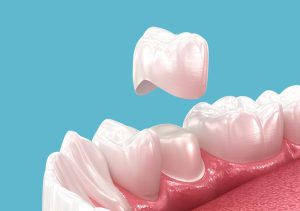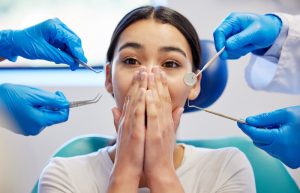Your Complete Guide to Long-Lasting Crown Maintenance
At the Edward J. Ambis Center for Dental Medicine in Ithaca, NY, we understand that receiving a dental crown is just the beginning of your journey to optimal oral health. Proper crown care can make the difference between a restoration that lasts five years and one that serves you faithfully for decades. Our experienced team, led by Dr. Edward Ambis with over 40 years of dental practice, is committed to helping patients from Ithaca, Lansing, Dryden, and Trumansburg maintain their beautiful, functional smiles for years to come.
 Dental crowns represent one of dentistry’s most successful restorative dental treatments. These custom-fitted caps cover damaged teeth completely, restoring both strength and appearance. However, their longevity depends entirely on how well you care for them after placement. Understanding proper crown maintenance helps you protect your investment while maintaining excellent oral health.
Dental crowns represent one of dentistry’s most successful restorative dental treatments. These custom-fitted caps cover damaged teeth completely, restoring both strength and appearance. However, their longevity depends entirely on how well you care for them after placement. Understanding proper crown maintenance helps you protect your investment while maintaining excellent oral health.
Ready to learn how to protect your dental crown investment? Call our Ithaca dental office at 607-272-1874 to schedule a consultation with Dr. Ambis and discuss your crown care routine.
The Edward J. Ambis Center Approach to Crown Care
At our Ithaca dental practice, Dr. Ambis brings over four decades of experience to crown care education. His extensive background, including advanced training at the Resnik Implant Institute, allows him to provide patients with comprehensive guidance on crown maintenance. We believe that patient education is fundamental to treatment success, which is why we take time during every appointment to discuss proper care techniques.
Our team recognizes that each patient’s needs are different. Some patients require additional guidance on flossing techniques around crowns, while others need help selecting appropriate oral care products. Dr. Ambis and his staff work individually with each patient to develop a maintenance routine that fits their lifestyle and addresses their specific concerns.
We also provide detailed written instructions for crown care, including emergency contact information should problems arise between appointments. Our goal is to help every patient feel confident in maintaining their crown while knowing professional help is always available when needed.
Your Quick Guide to Dental Crowns
A dental crown is a tooth-shaped cap that covers a damaged or decayed tooth entirely, restoring both strength and appearance. This dental restoration serves multiple purposes:
- Strengthens weakened teeth
- Improves the appearance of damaged teeth
- Restores normal chewing function
- Protects the entire tooth structure
The Dental Crown Procedure
The dental crown procedure typically involves two appointments:
- First Visit: Your dentist prepares the tooth and places a temporary crown
- Second Visit: The dentist removes the temporary crown and places your permanent crown
During the healing process, your new crown will integrate with your natural teeth, creating a seamless restoration.
How Long Do Dental Crowns Take to Heal?
 Most patients experience complete healing within the first few weeks after their dental crown procedure. During this time:
Most patients experience complete healing within the first few weeks after their dental crown procedure. During this time:
- Initial sensitivity is normal
- Soft-bristle toothbrush use is recommended
- Cold foods may cause temporary discomfort
- Full function typically returns within two to three weeks
Proper Care for Your Dental Crown
Daily Oral Hygiene Essentials
Maintaining dental crowns requires excellent daily oral hygiene:
Brushing Guidelines:
- Brush your teeth twice daily with fluoride toothpaste
- Use a soft-bristle toothbrush at a 45-degree angle
- Regular brushing prevents plaque buildup
- Focus on areas where your crown meets natural teeth
 Flossing Requirements:
Flossing Requirements:
- Floss daily around your crown
- Flossing regularly removes food particles
- Brushing and flossing together provide optimal protection
- Practice good oral hygiene consistently for the best results
Foods to Avoid with Your Crown
Hard or Sticky Foods to Limit:
- Ice cubes and hard candy
- Sticky foods like caramels and taffy
- Hard foods that could chip your crown
- Chewy foods that might pull at the restoration
Smart Eating Habits:
- Avoid chewing hard foods on your crown side
- Avoid biting on hard objects like pens or bottles
- Choose softer alternatives when possible
- Cold foods in moderation to prevent sensitivity
Dos and Don’ts After Getting a Crown
DO:
- Maintain good oral hygiene practices
- Visit your dentist for regular dental checkups
- Use a night guard if you grind your teeth
- Brush and floss daily without exception
- Contact your dentist immediately if problems arise
DON’T:
- Avoid chewing hard foods unnecessarily
- Don’t ignore persistent pain or sensitivity
- Don’t skip checkups and teeth cleanings
- Don’t use your crown to open packages
Types of Dental Crowns and Care
Crown Materials and Maintenance
Different materials require specific care:
- Zirconia crowns: Extremely durable, easy to maintain
- Metal alloys: Strong, but may show wear patterns
- Porcelain: Aesthetic, but requires care with hard foods
Durable materials all benefit from proper maintenance
Why Does It Stink Under My Crown?
 Odor under your crown typically indicates:
Odor under your crown typically indicates:
- Bacterial accumulation from poor oral hygiene
- Food particles trapped around the margins
- Possible gum disease development
- Need for professional cleaning
Solution: Improve good oral hygiene habits and visit your dentist promptly.
Professional Maintenance Requirements
Regular Dental Visits
Checkups and cleanings are essential for:
- Monitoring crown condition
- Preventing tooth decay around margins
- Early detection of gum disease
- Professional plaque removal
Visit your dentist every six months for optimal crown health.
When Problems Are Detected Early
Issues detected early often require simple treatment rather than crown replacement. Regular visits help identify:
- Significant damage before it worsens
- Tooth decay around crown margins
- Gum disease affecting the supporting tooth
- Fit problems that need adjustment
How Long Will a Dental Crown Last?
With proper care, most dental crowns last:
- 10-15 years on average
- Up to 20+ years with excellent care
- Lifespan depends on oral hygiene and eating habits
- Regular dental visits extend longevity
Special Considerations
Night Guard Protection
A night guard protects your crown from:
- Grinding and clenching forces
- Excessive wear during sleep
- Damage to the crown and natural teeth
- TMJ-related complications
Metal Allergies
Patients with metal allergies should discuss alternative materials with their dentist before the dental crown procedure.
Emergency Crown Care
Contact your Ithaca dentist immediately at 607-272-1874 for emergency dental care if you experience:
- Crown becomes loose or falls out
- Sharp pain when biting
- Visible cracks or chips
- Persistent bad taste or odor
How Long After a Permanent Crown Can I Eat Normally?
Most patients can resume normal eating habits within 24-48 hours after permanent crown placement. However:
- Avoid chewing hard foods for the first week
- Cold foods may cause sensitivity initially
- Sticky foods should be limited permanently
- Hard or sticky items require ongoing caution
Maximizing Your Crown Investment
Good Oral Hygiene Practices
 Good oral hygiene practices include:
Good oral hygiene practices include:
- Consistent daily brushing, flossing, and antimicrobial mouthwash routine
- Regular checkups with your dentist
- Proper maintenance prevents costly problems
- Practice good oral hygiene for lifelong benefits
Long-term Success Factors
- Dentist regularly monitors crown condition
- Good oral hygiene prevents complications
- Proper care extends crown lifespan
- Regular dental visits ensure optimal function
